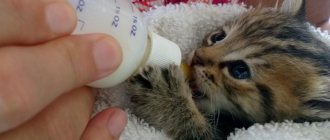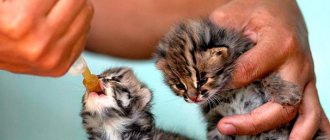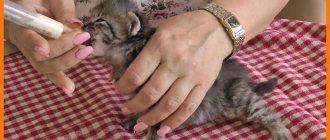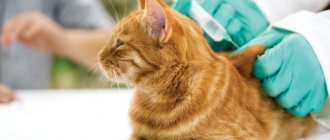How does a kitten develop: from birth to 2 months
A newborn is born completely helpless, and the task of the cat mother is to protect him from the dangers of the surrounding world. The stages of growing up a baby are as follows:
- From birth until 10 days of life, babies are completely blind and move only by crawling. Newborns cannot empty their bowels on their own; their mother helps them with this.
- In the period from 10 to 21 days, the cubs increase in size by an average of three times and weigh about 300-400 g. The babies' eyes open, but the animals cannot yet focus on objects. By the end of three weeks, the babies are already resting on their paws and their teeth are appearing.
- Between 21 and 45 days, barbels erupt up to 26 teeth. Pets move confidently and clearly see the world around them. At this time, feeding the babies with solid food begins.
- The period from 45 to 90 days is the stage when furries acquire most of their skills. They grow all their teeth, so the animals eat almost entirely solid food. At this age, cats are ready for the first vaccination in their lives.
After a three-month period, in grown-up individuals, their development is almost completely completed. Teenagers have strong immunity and their character has been formed. The pets are curious, eat solid food and are ready to leave their nest.
At what age are kittens spayed or neutered: recommendations
Neutered kitten
The earliest age to have your pet neutered is 6 months . This is the period of puberty of the animal. The optimal age for castration of a kitten is 7-8 months . Cats grow up to 1 year and it is best to do this when the body is formed, but not completely. It is from 6 to 8 months that this is the right time to castrate or sterilize a kitten.
Worth knowing: It is undesirable to delay castration, since an older animal experiences hormonal changes in the body.
Veterinarians recommend not castrating older animals - from 8 years old , due to the possibility of poor effects of anesthesia.
Conclusion: The ideal time for castration of cats is from 6 months to 8 years.
What skills does a mother cat instill?
Mom begins to teach the little ones the skills necessary for later life almost immediately after they open their eyes. The mother starts with the simplest thing - recognizing strangers and moving around. Gradually, pets acquire skills to behave in different situations and interact more actively with others.
After the baby turns one month old, the female instills in the children the basics of self-care. Small pets begin to learn how to properly care for themselves after using the toilet, eat carefully and wash their faces after eating.
During this same period, the mother actively takes the furbabies for a walk and teaches them how to behave correctly in the world around them. In an apartment or house, the female shows by example how to use the tray. The mother does everything so that after separation the children can survive and live a full life.
At what age can a kitten be treated for fleas: wear a collar, use drops?
Kitten treated for fleas
Fleas prevent the kitten from developing normally. In addition, they carry diseases. Therefore, it is necessary to promptly begin to protect the baby from these pestering insects. At what age can a kitten be treated for fleas? Here is the answer:
- You can treat a kitten against fleas using special drops starting from 1-2 months of age .
- After all, the presence of these insects can cause significant harm to the animal even in infancy.
- Of course, the age of the pet also determines the type of product. For very young kittens, you should choose more natural, gentle products.
- Those drops that are used to treat adult cats will not work.
- You can use sprays or drops on the withers.
- As a rule, at the age of 1-2 months, kittens are treated for fleas even by the most humane owners, who believe that it is not worth “tormenting” the animal until a month.
Worth knowing: If the kitten is less than 4 weeks old and has fleas, they do not use medicines, but folk recipes - as a rule, these are natural decoctions and infusions.
Anti-flea collars are also used to control fleas. But it is worth remembering that they do not serve to eradicate existing parasites, but for prevention. if fleas are already present, then it is better to resort to medication.
Important: Carefully study the composition of the drops and choose those whose recipe contains natural ingredients. After all, the smaller the kitten, the more sensitive its body.
During the treatment, the pet should not experience discomfort from substances with a pungent, unpleasant odor, much less suffocate. Keep an eye on your baby, and if he doesn’t like something or doesn’t feel well, then you need to remove the product as soon as possible.
When can you take a kitten from a cat?
It is not always possible to focus on how much time has passed since the baby was born. Before you bring your baby to a new home, you need to look at what it can do.
Determining readiness for independent living
By the time a mustache appears in a new home, it must have all the skills of an adult animal. This will help him in the future quickly adapt to changed living conditions and lead a full life.
By the time the baby begins independent life:
- move confidently;
- eat solid food independently;
- understand the purpose of the tray;
- know the basics of personal hygiene.
All these skills and abilities are instilled by the cat mother. The female teaches by example, and the children learn quickly and imitate well the habits of their mother. Everything necessary for further life is formed in the animal by 12 weeks. Experts consider this age to be optimal, and the answer at what age kittens can be taken away from a cat is: at 2.5-3 months.
Breed characteristics
Sometimes the age at which it is best to adopt a kitten is influenced by the baby’s belonging to a particular breed. For example, newborn Sphynx cats open their eyes on the second or third day after birth. But this does not mean that they develop the skills necessary for life earlier than others.
Outbred yard animals adapt to environmental conditions somewhat faster - their survival depends on this. Therefore, they need to find a home as soon as possible and end up in the caring hands of the owner. Classically, mixed breeds (that is, cats without a specific breed) can be given away as early as 2 months, that is, at 8-9 weeks.
At what age can you buy a kitten and sell kittens: expert advice
Bought a kitten
Often people persistently want to buy a tiny kitten that is barely a month old. Moreover, there is no shortage of advertisements from breeders who want to sell animals at such a young age.
There is an opinion that an older kitten will not form an attachment to its owner. This common misconception is fraught with dire consequences. Read the article on our website about how a kitten develops week by week , and you will understand why it is forbidden to take a little fluffy from its mother.
At what age can you buy a kitten and sell kittens? Experienced veterinarians are categorical on this matter. Here are the experts' advice:
- Don't complicate your life by caring for a kitten whose age has not reached 12 weeks.
- Younger creatures are very small and depend on their mother for everything.
- A three-month-old kitten may seem too old for those who would like to buy a funny little one and watch its development. But for a baby, this is the age when he will feel comfortable in a new place.
- Also, damage to the kitten’s well-being can be caused by tearing it away from its mother until the required time. Parting with a nurse and a familiar environment provokes anxiety and stress in the baby, which immediately affects health.
- In the worst case scenario, the kitten can become seriously ill and even die.
If you still have doubts and want to adopt a baby, then study the advantages of buying grown-up three-month-old kittens:
- Most babies at this age already stop drinking mother's milk and make do with regular solid foods.
- The course of preventive vaccinations prescribed for kittens is behind us, therefore, the immune system is adapted to changes.
- The kitten has mastered the rules of communication with relatives and animals like him.
- Fluffy is ready to meet his new home and is eager to explore the space he will soon find himself in.
Follow the advice of experts and then you will have a new furry friend at home who will be comfortable and safe in the new room.
What is meant by socialization
All owners expect their pets to be affectionate and obedient. But this requires effort.
In order for the future pet to grow up socialized and completely human-oriented, it is important to take the mustache in your arms immediately after it appears in the family. To train your baby, you need to do this for 15 minutes a day - minimum. In addition, the pet must be stroked, communicated and played with.
The basics of behavior and character traits begin to form in the cub very early. Therefore, the mother cat, and then the owner, must instill in the baby the rules of behavior in the outside world, doing this as affectionately and painlessly as possible.
A socialized cat is one that perceives the voice and distinguishes the intonations of the owner, is not afraid to be handled, plays with pleasure with a person, and is not afraid of guests and noisy companies. All this is ensured by constant communication and conversations.
As soon as the kitten gets comfortable in its new home, it is taught to bathe, clean its ears, and examine its oral cavity. It is important that from an early period of life the baby adequately responds to prohibitory commands and the owner’s dissatisfaction.
Why do this?
Improperly separating a kitten from its mother can greatly harm the baby, so the basic rules of separation should be known to everyone who is taking care of small kittens for the first time.
Kittens will switch from milk to food on their own when the time comes, but only if you keep them at home close to their mother at all times. And if you are going to transfer them into new, caring hands, weaning is necessary. This is due to the fact that you need to have time to give the kitten a new home before he finally gets used to you and the environment of your apartment. Otherwise, there is a chance that the baby will be afraid of the future owner and hide from him, perceiving him as a stranger. And of course, in its new life, the kitten must be able to feed on its own and do without mother’s milk.
How to properly take a kitten to a new home
The owner of a female with newborns must clearly understand what can and should be done when it comes to giving kittens away from the cat. This is a very exciting process, and you should prepare for it in advance.
Weaning from the mother cat
Veterinarians do not advise abruptly separating a cat from its cub. This will be very stressful for them. Knowing at what age kittens can be given away, the owner prepares in advance for this difficult process. In order to facilitate weaning from the mother cat, it is necessary:
- Wean the baby off mother's milk. This is done after the baby is 4 weeks old by introducing complementary foods. They start with wet industrial food or low-fat fermented milk products, tender chicken meat.
- Separate mother and babies for short periods of time. To do this, you need to place the little fluffy for a couple of hours in his own corner with a tray and bowl.
- Teach your baby to lap from a bowl on his own by filling a shallow plate with a mother's milk substitute.
By following all the recommendations, you can significantly reduce the time your little pet gets used to a new family and other conditions of independent living. In this case, his psyche and health will be in perfect order.
Arranging a new home for a small pet
Before a new family member arrives in the house, you need to carefully prepare. It is necessary to purchase what your pet will need not only in the first days, but also every day. Among the purchases for a little one should be:
- separate bowls for food and water;
- tray and suitable filler;
- scratching post;
- nail clipper;
- a pet bed for privacy;
- carrying;
- toys.
Everything you need can be purchased at a pet store or after consultation with a specialist. Before you take your fluffy home, you need to find out from its owner the type of food. You should not immediately transfer your baby to a new type of food. If the new owner decides to change the baby’s eating habits, then this must be done gradually.
How to help a mother cat cope with separation from her cubs
By 12 weeks, the female’s cubs become quite independent and no longer need the constant care of their mother and her milk. Fluffies are almost completely ready for independent life, but the cat itself is not always ready to part with it. Therefore, your pet must be prepared psychologically.
To do this, it will not be superfluous to take the babies away from the female for several hours. This will reduce milk production and an acute sense of concern for the offspring.
When the baby leaves and finds himself in a new family, you should immediately remove all things that have his smell. The disappearance of the cub's scent will reduce the female's instinctive desire to seek him out.
There is no need to scold a cat if she walks around an empty house and screams loudly. She will soon get used to being alone and stop calling for the little ones. It’s better to keep your pet busy with a game or distract her with her favorite treat.
At what age do kittens change their teeth, whiskers, and eye color?
A small kitten whose whiskers, teeth and eye color have not yet changed.
Milk teeth erupt in kittens at the age of 2 to 4 weeks.
- Somewhere in the third week, when the baby already has incisors and fangs, baby teeth begin to change to permanent ones.
- This process will be completely completed by 6-7 months .
- Read more in the article at this link , when kittens change their baby teeth, how this process occurs and how to help your baby so that it is less painless.
At what age do kittens change eye color ?
- A newborn baby's eyes do not yet have pigment, and therefore they are blue.
- The change occurs depending on the breed. A cat without a breed will have dark eyes at 1-1.5 months . In an animal with a pedigree, this process can last from 1 to 12 months.
- A cat's eye color finally changes by age 2 .
Vibrissae and tactile hairs are organs of sensitivity, inspection and tactility in a cat, which we call whiskers. They appear in infancy, then grow and change throughout the cat's life, unnoticeable to humans.
Interesting: It often happens that a mother cat gnaws off the whiskers of her children. It is not known why she does this, but the breeders are sure that this is necessary so that the stupid little tomboy does not crawl out of the nest prematurely. It will take six months for the kitten to grow new whiskers.
Who should vaccinate kittens?
Many medical procedures are planned for the first year of your pet's life. He is given several treatments against intestinal and skin parasites, and is given repeated vaccinations.
The first vaccination is given at 2-2.5 months. If the furry friend is still in the family with the mother cat at this time, then the owner of the female must take the cub to the veterinary clinic.
Usually, purebred kittens are taken only with vaccinations and an existing veterinary passport. And the future owner of the mustache simply follows the recommendations for subsequent vaccinations during adolescence. With mestizos it’s the other way around - if the child has already been taken away from its mother, then all responsibility for the life and health of the animal falls on the new owner.
At what age is a kitten considered a kitten?
Little kitten
Cats remain playful into old age, which is why they always look cute like kittens. Often, owners do not understand when their pet will become an adult. Until what age does a kitten remain a kitten?
- Kittens begin to move like adults at two months of age.
- Six-month-old animals enter adolescence. You should be careful at this time.
- Pets exhibit behavioral characteristics with might and main: they mark space, yell, and conquer territory in fights. However, an animal that has reached sexual maturity is still considered a kitten.
- The development of a cat is completed only by one and a half years. Now there is no doubt that the pet has finally matured.
- By this time, animals acquire not only physical, but also social maturity.
However, there is no shame in an adult cat frolicking like a kitten. If a cat remains active and inquisitive in his advanced years, then this is not a reason to doubt his maturity.
What happens if you take babies away from their mother at the wrong time?
There are circumstances in which the cub appears in the house earlier or much later than the optimal age, according to veterinarians, when kittens can be given away. Because of this, problems with socialization and even the health of the baby may arise.
Too early
Premature separation of a cat from children can lead to disruption of the digestive system of the children themselves. Up to 1.5 months, pets need enzymes contained in breast milk.
If the baby stops receiving a healthy product ahead of time, then problems with the gastrointestinal tract will inevitably begin. The cat’s body reacts to adult food with diarrhea or constipation, as well as the appearance of life-threatening dysbacteriosis.
Weaning a female for up to 2 months leads to a severe weakening of the baby's immune system. Without receiving the necessary amount of nutrients and protection from milk, the baby becomes vulnerable to dangerous infections.
In addition, up to 1 or 1.5 months, the cub has a strong emotional connection with its mother. Therefore, the stress from breaking this thread affects the mental and physical state, which leads to various ailments and behavioral problems.
Too late
If you take a fluffy from his previous family after 3 months of life, this will not threaten him with any health problems. The baby is fully strengthened, eats adult food, has the necessary skills of hygiene, communication with people, and should have already undergone the first vaccination and treatment against parasites in his life.
The future owner will not experience any particular difficulties with such a mustache, because the animal easily gets used to new living conditions and adapts to the surrounding reality - this period of ease lasts up to 7-8 months, that is, until the onset of puberty.
When purchasing or giving away a domestic cat cub, a person should know when to separate it from its mother. In order for your pet to grow up physically and mentally healthy, this should not be done before 2 months. It is up to 8 weeks of life that the baby develops the necessary skills and abilities, and also develops strong immunity. Closer to 3 months, the baby is completely ready to leave his mother and go into the caring hands of a new owner.
“Oh no, I got my kitten when he was only 4 weeks old!”
Sometimes kittens are adopted by a family at a very young age. Rescued kittens may even be newborns, separated from their mother for unknown reasons. In other cases, irresponsible cat owners who allow the cat to breed may be unaware of proper kitten care and separate them from their mother too early.
If you already have a kitten at such a young age, all you can do is learn about kitten care and try to provide your pet with the appropriate environment and care that it needs.
Tags kittens
At what age can a kitten’s claws be trimmed: recommendations
Kitten's nails are trimmed
Long nails are a nuisance to any pet. In addition, they can break, damaging the tip of the paw, and this is already dangerous, since an infection can get inside the body. At what age can a kitten's nails be trimmed? Answer:
- This can be done starting from 4 months . At this time, they are already beginning to interfere with the cat’s ability to run and move actively.
- The formation of claws begins much earlier - from 4-8 weeks of life , and if there is a possibility that the cub may be injured due to the length of its claws, you can begin the procedure much earlier than the deadline.
- At a younger age, kittens' claws are fragile, so they do not cause significant harm, but they can interfere and injure the paws if the animal accidentally gets caught on something.
Of course, you should also pay attention to how quickly the claws grow. After all, some animals' claws grow faster, while others grow slower. It is best to trim once or twice a month.
Important recommendation: When carrying out the first haircut, you should pay attention to accustoming your pet to the procedure, calming it down and encouraging it with treats.
At what age do kittens open their eyes?
A grown-up kitten with long-open eyes
Not every cat owner knows the characteristics of their pet’s body. Especially beginners cannot even answer such a question as opening the eyes of a kitten. Let's try to clarify the situation.
Experienced owners, based on their expertise, know that kittens open their eyes 7-20 days after birth . It all depends on the characteristics of the cat breed:
- The Sphinxes are considered to be leaders in this matter . There have been cases of these kittens being born with their eyes already open. Basically, on the third day, sphinxes already confidently look into the eyes of everyone around them.
- Next in line are representatives of Siamese, Thai and Siberian breeds . These include the British and Scots . The period of eye opening in such kittens occurs from the fifth to the tenth day.
- In last place are kittens of the Ragdoll . They open their eyes around 21 days after birth.
Worth knowing: Cats do not finally gain sight at the moment they open their eyes. They become fully sighted 5-8 days after they open their eyes.










